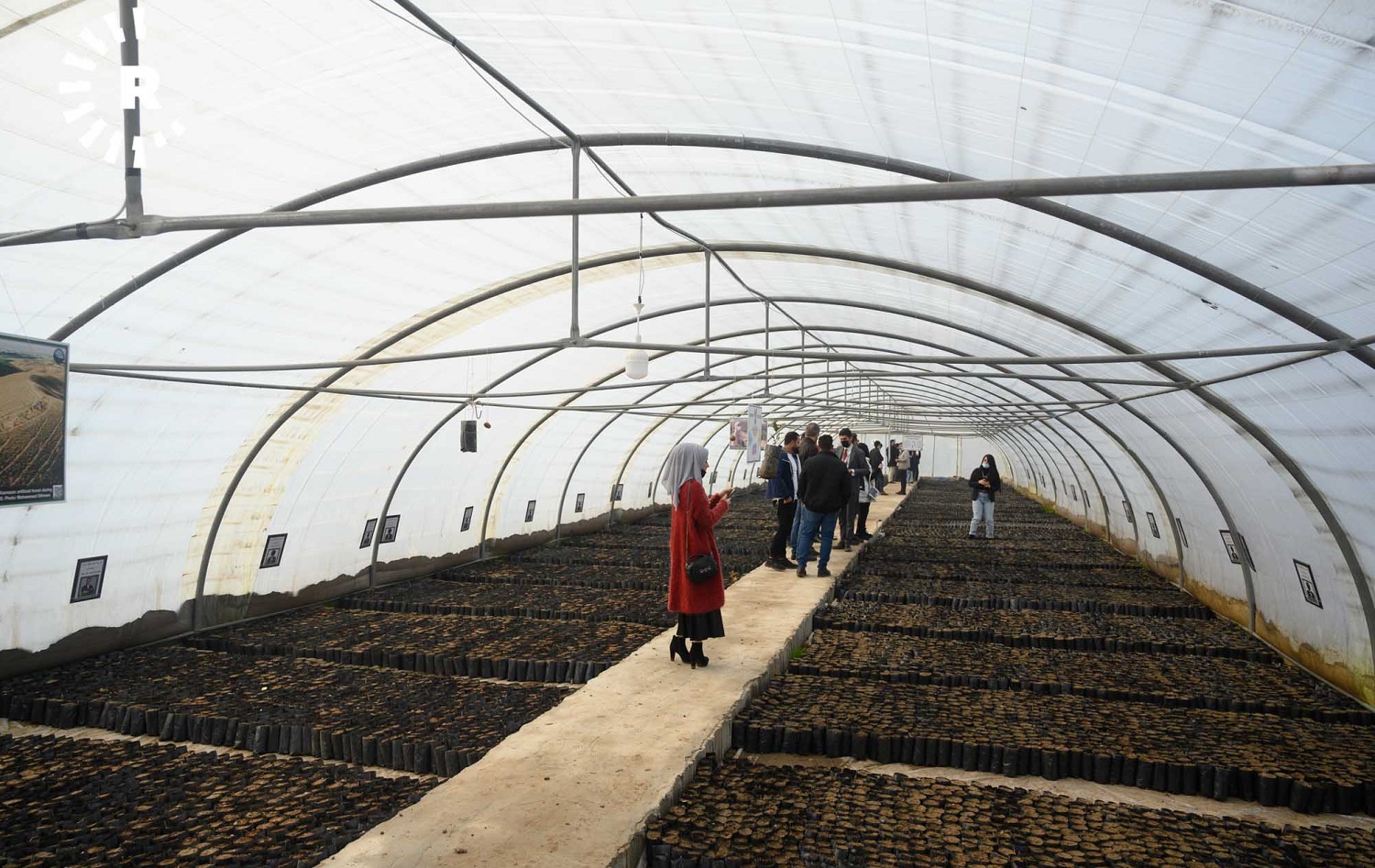
An oak sapling at a new greenhouse in Erbil’s Cihan University, part of the ‘One Million Oaks’ campaign launched by Hasar Organization, on December 18, 2020. Photo: Bilind T. Abdullah / Rudaw
ERBIL, Kurdistan Region — An environmental organization based in the Kurdistan Region inaugurated a greenhouse project in Erbil on December 18, as part of its plans to plant one million oak trees across the Region in the span of five years.
Hawkar Ali is a 34-year-old teacher at the University of Kurdistan Hewler (UKH), in Erbil. In March 2019, he co-founded Hasar Organization, which aims to plant one million oaks all over the Kurdistan Region by 2025. Central to that push is the new greenhouse at Erbil’s Cihan University, where 100,000 oak seedlings are to be grown.
The idea for the oak planting project came from Omar Bradosti, a Soran preacher who has planted more than 14,000 oak trees across the Kurdistan Region over the last three years. To test the waters, Hasar planted 2,000 oak saplings in an artificial forest in Kasnazan, on the outskirts of Erbil on December 4.
Oaks are particularly important trees for the preservation of Kurdistan’s ecosystem, Ali said.
“I chose oak trees not because it’s my choice, but because it’s the ecosystem’s choice,” he said. “Okay, I know Paulownia is nice, but it’s not for me, it’s for the environment – maybe for a lizard, maybe for a snake, squirrels, who knows?”
More than 2.2 million acres of Kurdistan Region woodland was been lost between 1999 and 2018, destroyed by wildfires and deforestation. In recent years, Iranian border guards, Turkish airstrikes and Islamic State militants have set thousands of acres alight. Nearly 5,000 acres of land were burned in the Kurdistan Region by Turkish and Iranian bombs in the summer of 2020 alone, according to the Netherlands-based PAX NGO.
The organizers of the greenhouse’s inauguration know full well that planting trees is no absolute solution to the Kurdistan Region’s environmental woes.
For Hasar member Gashbin Idris, care for the environment started out while he was a student, through the simple act of cleaning his university classroom every morning.
“Being here doesn’t mean I’m only thinking of one million trees,” Gashbin said. “I’d be having a meal at home and thinking of ways to save the environment”.
For Intira Thepsittawiwat, a Thai contributor to the project now living in Erbil, “it’s about giving back to the Kurdistan Region, to make it greener."
Initra has lived in Erbil since July 2018 with her husband, the consul-general of Czech Republic in Erbil. Moving with him from one country to another, Intira would use each country’s local products to practice her love of handicrafts, provide job opportunities to locals, and – in case of the Kurdistan Region where she noticed an absence of trees when she would hike – promote environmental initiatives.
She started her non-profit Intimade project to make handmade face masks in the Kurdistan Region more than a month ago; Hasar is the first organisation she has offered her project’s support to. She donates 100 percent of her profits to planting trees through the organization.
“We should protect ourselves and protect each other, and give back to nature,” she said of her investment in Hasar.
A second greenhouse will house some more of the acorns; others will be distributed to small greenhouses at the homes of people who want to help raise seeds into saplings.

When 28-year-old Govar Kamil isn’t working at the UKH public relations department, he is a carpenter, running a workshop near his house and an online store called Darkhana - branded with a logo of a squirrel clutching an acorn.
Kamil, nicknamed Bla, contributes to the million tree project by making small greenhouses for the saplings destined for the homes of those willing to look after them, made from recycled wood.
“As a carpenter, I know that cutting wood is harmful for the environment, but we still need it for our furniture,” Bla said. “I cut a tree to make a product, but I plant two trees to replace the one I cut down.”
The minds of many in the Kurdistan Region are occupied by other, seemingly more urgent crises -- including the ongoing coronavirus pandemic. But Hasar co-founder Ali believes that the global climate crisis is more dangerous than the coronavirus; climate change is slower, but with effects “more severe than coronavirus,” he added.
Earlier this month, the United Nations called Iraq “one of the most climate vulnerable countries in the world”.
“Urgent climate action is needed if we are to safeguard the environment for future generations,” read a joint statement from the UN mission in Iraq (UNAMI), Britain, France, and Italy as the 2020 Climate Action Ambition Summit launched on the fifth anniversary of the landmark Paris Agreement.
“All countries should be prepared for the climate emergency,” Ali said.
“We are involved in different issues – economic crisis, internal conflict, military conflict with ISIS… the government is busy with such things, but I have time”, he said. “Our responsibility as an NGO is to help the KRG in such a crisis”.








Comments
Rudaw moderates all comments submitted on our website. We welcome comments which are relevant to the article and encourage further discussion about the issues that matter to you. We also welcome constructive criticism about Rudaw.
To be approved for publication, however, your comments must meet our community guidelines.
We will not tolerate the following: profanity, threats, personal attacks, vulgarity, abuse (such as sexism, racism, homophobia or xenophobia), or commercial or personal promotion.
Comments that do not meet our guidelines will be rejected. Comments are not edited – they are either approved or rejected.
Post a comment